N&O: The System Worked
As we noted yesterday, the State Bar's historic move to file charges against a rogue prosecutor while a case remained pending is counter to its own policy to defer to the court's concurrent jurisdiction in such matters. Arguing that a once-ever instance of emergency intervention - intervention that comes essentially outside the norm or established system - is proof that the system works defies reason. Further, crediting the State Bar for acting on the conspiracy to withhold evidence by filing additional charges (an act which came after the District Attorney had recused himself) while downplaying the extraordinary efforts to uncover the conspiracy also stands on shaky legs. It's difficult to understand giving the Bar sole props for its applause worthy intervention without also recognizing the heroic efforts that inspired the intervention in the first pace.The main heroes of this case weren't the defense attorneys or Attorney General Roy Cooper, who declared the three young men innocent. The State Bar really set the stage for exoneration.
The Bar's executive director, L. Thomas Lunsford II, told me that even though the initial complaint against Nifong was filed in response to a grievance filed by a private citizen, the Bar had already begun to monitor Nifong's actions as early as March 30 of last year. The organization, he added, probably would have filed a complaint on its own had the citizen not stepped forward.
The case the Bar has amassed against Nifong is so compelling, losing his job and law license could be the least of his troubles. He could end up fighting for his freedom.
If the State Bar's attorneys can successfully prove that Nifong knowingly withheld exculpatory DNA evidence from the defense and then lied about it to the court, that record might be hard for law enforcement officials to ignore. Sure, it's speculation, but I wonder whether Nifong could be the only one from the Duke lacrosse case to end up with a conviction.
Despite the effective actions by the State Bar, Attorney General Cooper felt compelled to look into the cameras and propose a new law to give the state Supreme Court authority to remove a district attorney from a case.
Bizarrely, Martinez also cites the 7A-66 filed by Beth Brewer, and shelved in defiance of the statute by Judge Orlando Hudson, as additional evidence that the system works.
"A Superior Court judge already has the authority to remove a rogue D.A. from the job, which obviously would take him or her off every case, not just the one in question by the Supreme Court.Taking his own argument full circle and incredibly belying the title of his opinion piece, Martinez concludes by arguing that part of the system, in fact, did not work."That's because under North Carolina law, any citizen can petition to remove a district attorney for cause. One already has.
"Durham political activist Beth Brewer has filed this type of complaint against Nifong. Thus, even if Nifong keeps his law license after his State Bar ethics hearing in June, he would have to answer Brewer's complaint at a court hearing to keep his job."
Sadly, Martinez employs the same argument attempted by Defendant Nifong's attorney Dudley Witt, who suggested that the efforts of Brad Bannon to discover the exonerating evidence hidden in a massive data dump were no more than an ordinary function of the adversarial system that all defendants, regardless of means, should be subjected to. This notion that legal protection afforded to the accused rather than legal protections afforded by the accused led to exoneration is as dangerous in print when arguing for maintaining the status quo as it is in a bar hearing when arguing that all prosecutors should be allowed to proceed as Nifong did.If Cooper wants to improve the state's justice system, he should address the weakness in the grand jury system pointed out by Dave Evans following the dismissal of charges. When he inquired about the grand jury record that led to his indictment, Evans discovered that a written record doesn't exist.
Every lawyer I've spoken to in the past week, including Garry Frank, president of the N.C. Conference of District Attorneys, says it's time to modernize the grand jury system to include on-the-record proceedings. That's not unprecedented. When an investigative grand jury is empaneled, although a rare occasion according to Frank, the examination of witnesses is under oath.
Former federal prosecutor (and former Raleigh City Council member) Kieran Shanahan told me that every grand jury should have investigative powers and not be limited to evidence presented by the district attorney and police. He thinks the state should pattern its grand juries after the federal system.
Although the lacrosse case has been tragic, its one silver lining should not be overlooked. Today, Seligmann, Finnerty and Evans are free -- proof positive that legal protections afforded to the accused work.
Now let's concentrate on fixing the grand jury system that wrongly indicted them in the first place.
Without taking issue with the suggestions that the State Bar's efforts were heroic and that the NC grand jury system needs to move out of the Stone Age, it remains impossible to accept that a system which allowed innocent people to be subjected to the unchecked willful wrath of a rogue prosecutor for so long and at such expense, personal and financial, worked. The suggestion alone does little more than add insult to injury while doing nothing to ensure that the same menace is not faced by other innocents.





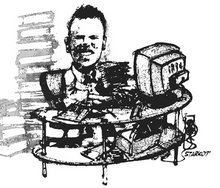
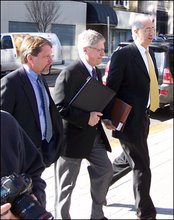
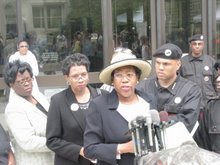
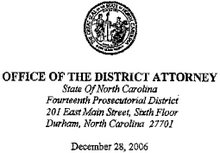
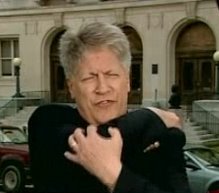

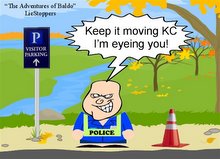

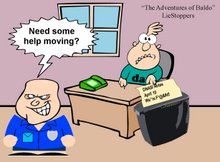

















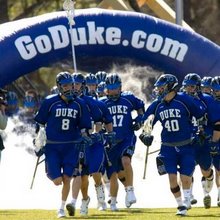

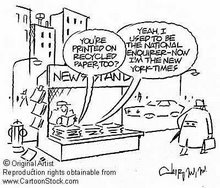

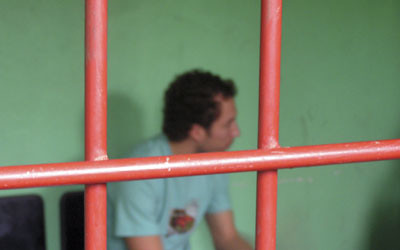



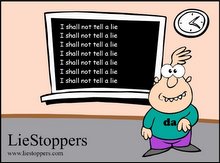






9 comments:
Alas, it amounts to the rantings of a deranged man who truly believes he can make a silk purse out of a sow's ear. Idiot.
It's bizarre.
Hoax victim Reade Seligmann is humbled by his railroading, and points out that the factors that led to his exoneration wouldn't apply in most ordinary cases of police and prosecutorial misconduct.
Typically, Seligmann noted, the accused will lack what he had: family resources (retirement to cash in; home equity line to max out), top-flight lawyers, ironclad alibi, and national attention. But even poor and minority suspects deserve Due Process and a fair shake from the criminal justice system.
Meanwhile, the Hard Left intellectuals, "community activists," and journalists who style themselves the champions of the rights of poor and minority suspects leave no stone unturned in the search for the missing "Something Happened" or "The System Worked" clue.
Even in the face of overwhelming evidence of innocence, privileged and white suspects must submit to the whims of the crooked and the ignorant.
What an awful precedent these champions of poor and minority suspects are setting for... poor and minority suspects.
Bizarre.
He is an idiot. An under-educated wannabe who is laughable, and most serious people who read the N & O recognize he (and his wife) are only drive-time radio fill-ins. Truly ignorant....of the Ruth Sheehan mold.
Carolyn says:
How can anyone in their right mind say a system 'worked' when it forced 3 innocent young men to spend $1 million apiece, hire 8 lawyers, lose their job and schooling, plus endure an entire year of abuse and anguish before the state's attorney general finally admitted there was no crime in the first place?
So the "system worked" because the bar put Nifong into legal jeopardy? He had to choose between doing his job (and risk exposing himself to more ethics charges) or recusing himself. I don't think anyone who has given this serious consideration could espouse that the answer to the problem is to put rougue DAs into a tenuous legal position and hope he chooses the recuse himself.
I asked my state senator, Marc Basnight, to take action to get the NC grand jury system to keep records of its proceedings. He responded with a blah blah blah form response "thank you for writing, etc. etc..." I don't know what it will take to get some of our so-called representatives off their backsides and get their act cleaned up. If there were a record of what Nifong told the GJ, there would be a better understanding of the depths of corruption Nifong sank to.
RE: the proposal to allow the Supreme Court to remove a DA from a case. The people elect the DA. If the DA is engaged in misconduct, the people should have the right to recall him via a referendum process. In any number of jurisdictions, they do.
It is absurd to leave all the power in the hands of one or two judges who are likely to be part of the same old-boy network as the rogue prosecutor.
The system didn't work here. The only reason this case ended is Cooper took over. Many times defense attorneys filed motions and they were never responded to or acted on. Nifong was free to smirk and lie in court with immunity. Every judge involved in this case has been an embarrassment to our judicial system.
The idea that the system works is either a misunderstanding of systems or a deliberately obtuse parsing. One could say that one of the backup (exception handling) feature worked, but the the core system is hardly robust.
As an example, I used to design air traffic control communications systems. They were installed in air traffic control towers and centers to communicate with aircrafts. As part of the backup system, telephones, radios and even cellphones were employed. If the situation ever arised such that the switch malfunctioned (which did happen on occassion) and a cellphone had to used to get an airplane on the ground, no one would proclaim that "the system worked," and leave it at that. Sure, the exception handling worked, but you don't want to rely on it. The main system is going to be looked at and fixed.
Post a Comment